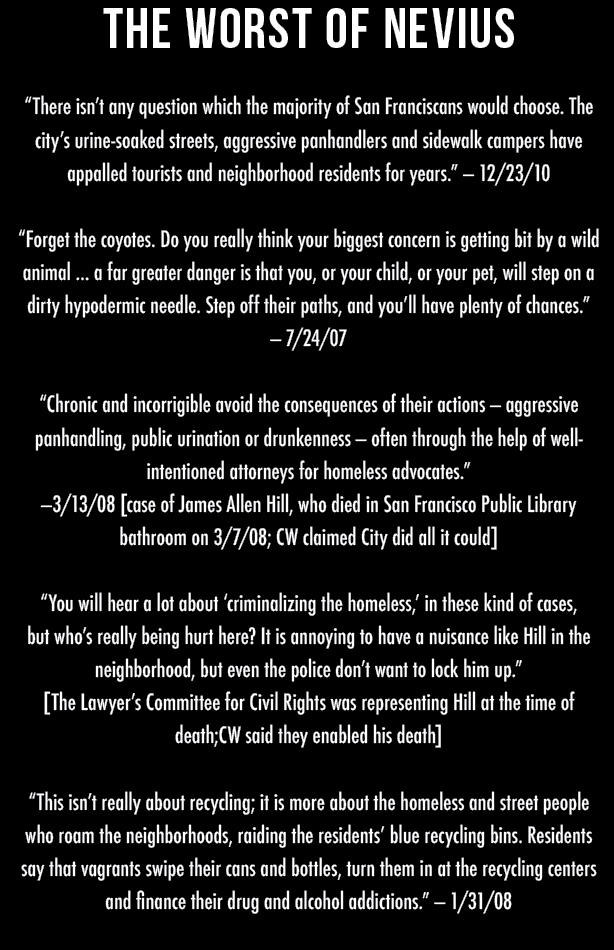
In the column where Nevius announced his impending departure, he speculated on a celebratory dance performed by Jennifer Friedenbach, director of the Coalition on Homelessness, which publishes Street Sheet. He also linked this musing to an open letter he published, lambasting the Coalition’s decades-long efforts to serve, empower and advocate for the homeless community that he concurrently maligned.
That he would imagine a happy dance in his honor should come as no surprise to longtime readers of his paper and ours.
He began his Chronicle tenure covering the Oakland Raiders. Eventually he moved from the sports section to penning columns about city life in San Francisco — while living across the Bay in suburban Walnut Creek until moving to the city in 2010.
His coverage of homelessness defined his work, similar to the way the Iraq war defined George W. Bush’s presidency or the 49ers’ performance under CEO Jed York’s tenure. It also provided the public face of anti-homeless sentiment in San Francisco and mouthpiece for “tough love” — read: criminalizing — tactics on the most visible and troubled members of the homeless population.
The passage from July 24, 2007, compares homeless people to natural predators: “Forget the coyotes. Do you think your biggest concern is getting bit by a wild animal? Frankly, if you are in Golden Gate Park, a far greater danger is that you, or your child, or your pet, will step on a dirty hypodermic needle. Step off their paths, and you’ll find plenty of chances.”
Nevius wrote this in a year that saw sweeps of homeless people in the parks. These sweeps were performed under the rationale that the inhabitants were drug-crazed hobos who despoiled the natural beauty of the parks with their refuse and drug paraphernalia.
Adopting the persona of a frustrated Everyman, Nevius crusaded against the most glaring symptoms of homelessness, such as panhandling, rummaging for recyclables, or just for their mere outdoor presence.
To this end, Nevius promoted anti-homeless policies: Care Not Cash, the sit-lie law, sweeps of tent villages along Division Street, and most recently, Proposition Q, the tent ban measure that appears as if it will pass but is still undecided. The Chronicle gave prominent placement to his views, sometimes on Page One.
As early as 2007, Nevius posited a city official’s idea that took form of the sit-lie law. In 2010, then-mayor Gavin Newsom put it on the ballot, and the Chronicle’s coverage swayed a majority of voters into passing the ordinance. The now-defunct Bay Citizen found that out of the 71 columns he wrote that year, Nevius dedicated about one-third to sit-lie and related issues: Nevius wrote 20 columns and two blog posts in favor of sit-lie, and the paper ran 29 favorable items overall.
“This was an issue that resonated,” Nevius told the New York Times. “I understand the role of an advocate. You just can’t say ‘no’ to everything.”

Yet, earlier this year, he proposed saying “no” to people without housing after a month-long media discussion on homelessness.
“Any person who comes to San Francisco and sits down on the street becomes our problem,” he wrote. “We can set a cap, or a ceiling on what we will do, how much we can spend and how many people we’ll help at a time.”
The thing is, “our problem” is actually a compound of several problems: economic inequity, federal divestment from affordable housing, and diminishment of working-class jobs, just to name a few.
Nevius’s annoyance with the homeless population extended to the homeless advocacy community. When James Allen Hill, a homeless man, died in a library bathroom in March 2008, Nevius said that the Coalition enabled Hill’s alcohol-related demise, simply by referring Hill to legal counsel for his multiple status-offense citations. In Nevius’s narrative, the “system” did all it could for Hill—short of providing addiction treatment, of course—but was thwarted by the advocates’ pesky insistence on due process.
Journalism has its own terms of art. One of these is “the takeaway.” Street Sheet hopes that The Chronicle’s takeaway will be that it attacks the problem of homelessness, not homeless people. May The Chronicle and Nevius’s successor remember that.

